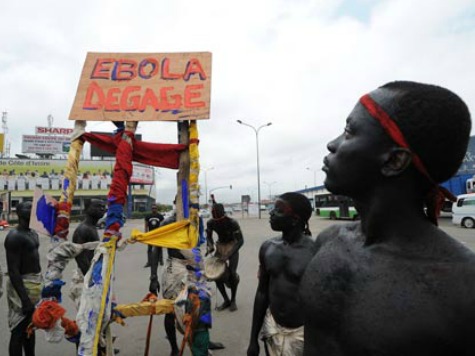
The spread of the Ebola virus out of Guinea and into Sierra Leone has been traced back to one woman in a remote border village who advertised herself as an herbalist with magical powers that could defeat Ebola. Through encounters with patients crossing the border, the herbalist died, and spread the virus at her funeral to others.
The Agence France-Presse reports that health officials in Sierra Leone have determined precisely where the first individuals carrying the Ebola virus carried it from Guinea into Sierra Leone and why: an herbalist, who has not been named, advertised herself as having special healing properties that could defeat an Ebola infection. The woman died shortly after tending to a number of her clients, and in the process of her funeral, the women tending to her body also contracted the virus.
For some time, AFP reports, the deaths occurred only in rural areas: “The herbalist’s mourners fanned out across the rolling hills of the Kissi tribal chiefdoms, starting a chain reaction of infections, deaths, funerals and more infections.” But eventually, one of the infected individuals made their way to Kenema, the third largest city in Sierra Leone, with a population of 190,000.
As the Daily Mail notes, Kenema was slower than other areas to identify the virus as it is also home to a disease known as Lassa fever, which shares many of Ebola’s symptoms but is treated differently. Nurses and doctors treating Ebola patients were, for some time, under the impression that they were treating Lassa fever. Twelve nurses have died in Kenema hospital, with another ten surviving the viral infection.
District medical officer Mohamed Vandi tells the Daily Mail he believes many of these nurses were working precisely because they did not believe they were treating Ebola. ‘The nurses who lost their lives and those who got infected would never have gone in knowing that they would get infected,” he said.
Ebola has killed 365 people in Sierra Leone so far, and more than 1,300 in Guinea, Liberia, Sierra Leone, and Nigeria, as well as one death in Spain– a priest who had been working with Ebola victims in Liberia and was airlifted out of the country. The World Health Organization, which has deemed the outbreak an international emergency, has noted that the death toll has begun to rise exponentially as incubation periods for the virus, which can last from one to three weeks, begin to expire.
In addition to fighting the Ebola virus itself, governments have had to struggle against individuals protesting Ebola, believing it to be a government scheme used to either collect money or harvest the organs of patients said to have Ebola. In Liberia yesterday, police shot tear gas and bullets at a mob angrily protesting the quarantining of a densely populated slum in the capital, Monrovia. They have also needed to take extreme measures to prevent looters from breaking into Ebola treatment centers.

COMMENTS
Please let us know if you're having issues with commenting.